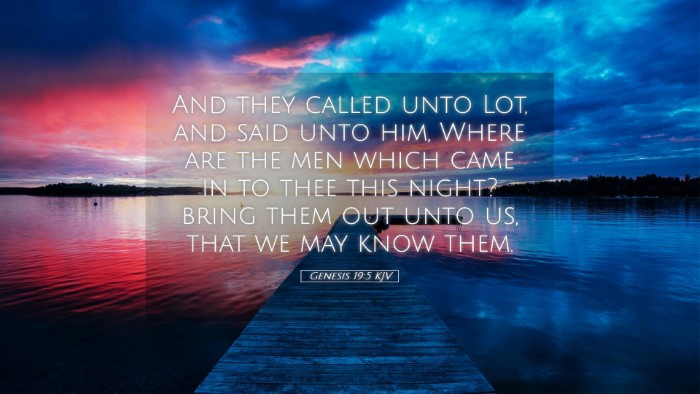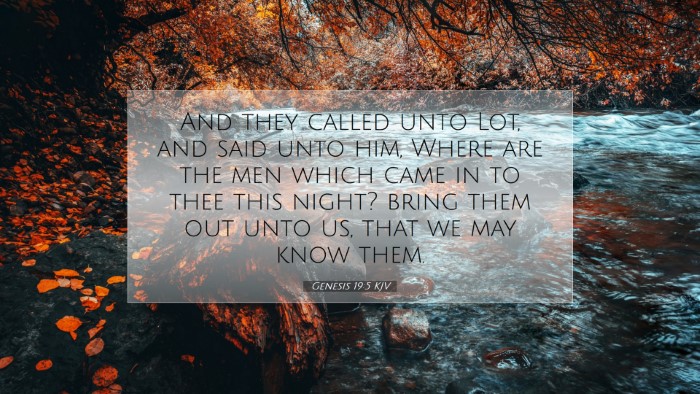Commentary on Genesis 19:5
Verse: Genesis 19:5 - "And they called unto Lot, and said unto him, Where are the men which came in to thee this night? bring them out unto us, that we may know them."
Introduction
This verse forms a critical juncture in the narrative of Sodom and Gomorrah, highlighting the moral decadence of the city. The expression "that we may know them" indicates a desire for sexual relations, reflecting the sinful nature of the inhabitants of Sodom. Biblical scholars have long examined this verse, recognizing its implications for understanding human depravity, hospitality, and divine judgment.
The Context of Sodom and Gomorrah
The cities of Sodom and Gomorrah are often viewed as archetypes of immorality and sinfulness. Readers of this text should consider:
- The Historical Setting: Sodom was noted for its wickedness, which was so great that it provoked the Lord to investigate and ultimately judge the cities.
- Theological Implications: The narrative emphasizes the importance of hospitality, as Lot had taken in the angels unaware, reflecting ancient Near Eastern customs.
- Human Nature: This verse underscores the depth of human depravity as the citizens, rather than practicing hospitality, sought to exploit the visitors.
Exegesis of the Verse
Scholars such as Matthew Henry note that the dialogue illustrates the open defiance of God's commandments. The men of Sodom symbolize a society completely lost in its lusts, actively pursuing sin without regard for consequences.
Albert Barnes adds that the insistence of the Sodomites to "know" the visitors signifies not merely acquaintance but a carnal knowledge that reveals their depraved desires. This request demonstrates a complete disregard for the sanctity of individual dignity and the principles of hospitality.
Adam Clarke further emphasizes that this request for knowledge shows a rejection of Lot’s role as a protector and host, culminating in a mob mentality devoid of morality. Their aggressive demand illustrates how deeply ingrained sin had become in this society.
Cultural Considerations
The cultural backdrop of Sodom reveals much about the societal values at this time:
- Hospitality as a Virtue: In ancient Near Eastern cultures, hospitality was a sacred duty; Lot's actions initially reflect this virtue by welcoming the angels.
- Immorality and Power: The desire of the Sodomites to dominate others through sexual coercion highlights not only their moral decline but also a broader theme of power dynamics present in human relations.
Theological Reflections
From a theological perspective, Genesis 19:5 brings forth several reflections:
- The Nature of Sin: The verse acts as a litmus test for understanding sin's effects on society—what starts as individual immorality escalates into collective depravity.
- Divine Judgment: The call for Lot to surrender the angels foreshadows the impending judgment from God, serving as a grim reminder of divine justice.
- God's Mercy: Even within the impending judgment, God's mercy is evident in that Lot is offered a chance to protect his guests, highlighting the balance between judgment and grace.
Practical Applications
This passage offers several significant lessons for modern readers, especially for pastors and theologians seeking to apply biblical teachings in contemporary contexts:
- Upholding Hospitality: The narrative challenges us to consider how we practice hospitality and whether we truly welcome strangers and those different from ourselves.
- Confronting Injustice: Believers are called to recognize and resist societal sins that dehumanize and degrade, paralleling the call for justice found throughout Scripture.
- Guarding Against Moral Decline: The story of Sodom serves as a warning about the dangers of drifting into moral apathy, urging communities to be vigilant in cultivating righteousness.
Conclusion
Genesis 19:5 encapsulates the struggle between virtue and vice, drawing readers into a deeper understanding of societal sin and divine judgment. The insights provided by historical and theological commentaries inform our interpretation, filling the text with meaning and relevance. It serves not only as a historical account but as a timeless admonition regarding the moral fabric of society and the call for faithfulness amidst corruption.


